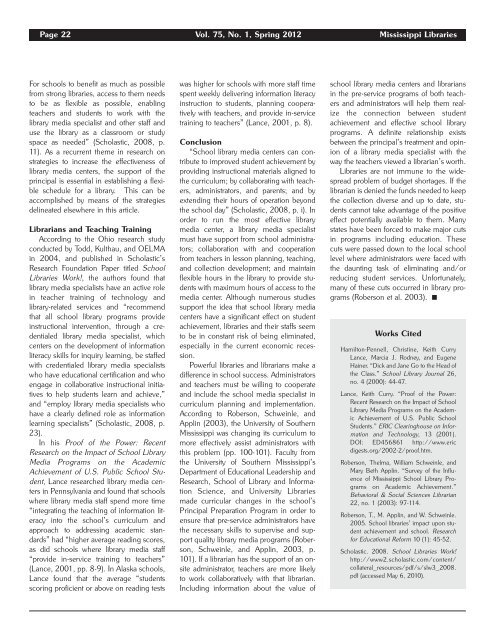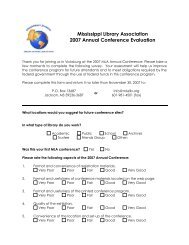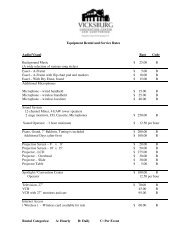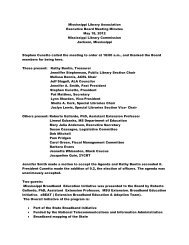Full Text (PDF) - Mississippi Library Association
Full Text (PDF) - Mississippi Library Association
Full Text (PDF) - Mississippi Library Association
Create successful ePaper yourself
Turn your PDF publications into a flip-book with our unique Google optimized e-Paper software.
Page 22 Vol. 75, No. 1, Spring 2012 <strong>Mississippi</strong> Libraries<br />
For schools to benefit as much as possible<br />
from strong libraries, access to them needs<br />
to be as flexible as possible, enabling<br />
teachers and students to work with the<br />
library media specialist and other staff and<br />
use the library as a classroom or study<br />
space as needed” (Scholastic, 2008, p.<br />
11). As a recurrent theme in research on<br />
strategies to increase the effectiveness of<br />
library media centers, the support of the<br />
principal is essential in establishing a flexible<br />
schedule for a library. This can be<br />
accomplished by means of the strategies<br />
delineated elsewhere in this article.<br />
Librarians and Teaching Training<br />
According to the Ohio research study<br />
conducted by Todd, Kulthau, and OELMA<br />
in 2004, and published in Scholastic’s<br />
Research Foundation Paper titled School<br />
Libraries Work!, the authors found that<br />
library media specialists have an active role<br />
in teacher training of technology and<br />
library-related services and “recommend<br />
that all school library programs provide<br />
instructional intervention, through a credentialed<br />
library media specialist, which<br />
centers on the development of information<br />
literacy skills for inquiry learning, be staffed<br />
with credentialed library media specialists<br />
who have educational certification and who<br />
engage in collaborative instructional initiatives<br />
to help students learn and achieve,”<br />
and “employ library media specialists who<br />
have a clearly defined role as information<br />
learning specialists” (Scholastic, 2008, p.<br />
23).<br />
In his Proof of the Power: Recent<br />
Research on the Impact of School <strong>Library</strong><br />
Media Programs on the Academic<br />
Achievement of U.S. Public School Student,<br />
Lance researched library media centers<br />
in Pennsylvania and found that schools<br />
where library media staff spend more time<br />
“integrating the teaching of information literacy<br />
into the school’s curriculum and<br />
approach to addressing academic standards”<br />
had “higher average reading scores,<br />
as did schools where library media staff<br />
“provide in-service training to teachers”<br />
(Lance, 2001, pp. 8-9). In Alaska schools,<br />
Lance found that the average “students<br />
scoring proficient or above on reading tests<br />
was higher for schools with more staff time<br />
spent weekly delivering information literacy<br />
instruction to students, planning cooperatively<br />
with teachers, and provide in-service<br />
training to teachers” (Lance, 2001, p. 8).<br />
Conclusion<br />
“School library media centers can contribute<br />
to improved student achievement by<br />
providing instructional materials aligned to<br />
the curriculum; by collaborating with teachers,<br />
administrators, and parents; and by<br />
extending their hours of operation beyond<br />
the school day” (Scholastic, 2008, p. i). In<br />
order to run the most effective library<br />
media center, a library media specialist<br />
must have support from school administrators;<br />
collaboration with and cooperation<br />
from teachers in lesson planning, teaching,<br />
and collection development; and maintain<br />
flexible hours in the library to provide students<br />
with maximum hours of access to the<br />
media center. Although numerous studies<br />
support the idea that school library media<br />
centers have a significant effect on student<br />
achievement, libraries and their staffs seem<br />
to be in constant risk of being eliminated,<br />
especially in the current economic recession.<br />
Powerful libraries and librarians make a<br />
difference in school success. Administrators<br />
and teachers must be willing to cooperate<br />
and include the school media specialist in<br />
curriculum planning and implementation.<br />
According to Roberson, Schweinle, and<br />
Applin (2003), the University of Southern<br />
<strong>Mississippi</strong> was changing its curriculum to<br />
more effectively assist administrators with<br />
this problem (pp. 100-101). Faculty from<br />
the University of Southern <strong>Mississippi</strong>’s<br />
Department of Educational Leadership and<br />
Research, School of <strong>Library</strong> and Information<br />
Science, and University Libraries<br />
made curricular changes in the school’s<br />
Principal Preparation Program in order to<br />
ensure that pre-service administrators have<br />
the necessary skills to supervise and support<br />
quality library media programs (Roberson,<br />
Schweinle, and Applin, 2003, p.<br />
101). If a librarian has the support of an onsite<br />
administrator, teachers are more likely<br />
to work collaboratively with that librarian.<br />
Including information about the value of<br />
school library media centers and librarians<br />
in the pre-service programs of both teachers<br />
and administrators will help them realize<br />
the connection between student<br />
achievement and effective school library<br />
programs. A definite relationship exists<br />
between the principal’s treatment and opinion<br />
of a library media specialist with the<br />
way the teachers viewed a librarian’s worth.<br />
Libraries are not immune to the widespread<br />
problem of budget shortages. If the<br />
librarian is denied the funds needed to keep<br />
the collection diverse and up to date, students<br />
cannot take advantage of the positive<br />
effect potentially available to them. Many<br />
states have been forced to make major cuts<br />
in programs including education. These<br />
cuts were passed down to the local school<br />
level where administrators were faced with<br />
the daunting task of eliminating and/or<br />
reducing student services. Unfortunately,<br />
many of these cuts occurred in library programs<br />
(Roberson et al. 2003). <br />
Works Cited<br />
Hamilton-Pennell, Christine, Keith Curry<br />
Lance, Marcia J. Rodney, and Eugene<br />
Hainer. “Dick and Jane Go to the Head of<br />
the Class.” School <strong>Library</strong> Journal 26,<br />
no. 4 (2000): 44-47.<br />
Lance, Keith Curry. “Proof of the Power:<br />
Recent Research on the Impact of School<br />
<strong>Library</strong> Media Programs on the Academic<br />
Achievement of U.S. Public School<br />
Students.” ERIC Clearinghouse on Information<br />
and Technology, 13 (2001).<br />
DOI: ED456861 http://www.eric<br />
digests.org/2002-2/proof.htm.<br />
Roberson, Thelma, William Schweinle, and<br />
Mary Beth Applin. “Survey of the Influence<br />
of <strong>Mississippi</strong> School <strong>Library</strong> Programs<br />
on Academic Achievement.”<br />
Behavioral & Social Sciences Librarian<br />
22, no. 1 (2003): 97-114.<br />
Roberson, T., M. Applin, and W. Schweinle.<br />
2005. School libraries’ impact upon student<br />
achievement and school. Research<br />
for Educational Reform 10 (1): 45-52.<br />
Scholastic. 2008. School Libraries Work!<br />
http://www2.scholastic.com/content/<br />
collateral_resources/pdf/s/slw3_2008.<br />
pdf (accessed May 6, 2010).














